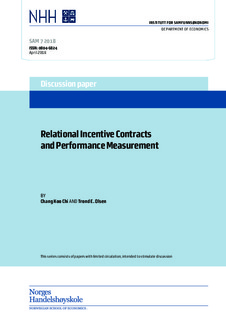| dc.contributor.author | Chi, Chang Koo | |
| dc.contributor.author | Olsen, Trond E. | |
| dc.date.accessioned | 2018-04-24T06:40:53Z | |
| dc.date.available | 2018-04-24T06:40:53Z | |
| dc.date.issued | 2018-04 | |
| dc.identifier.issn | 0804-6824 | |
| dc.identifier.uri | http://hdl.handle.net/11250/2495533 | |
| dc.description.abstract | This paper analyzes relational contracts under moral hazard. We first show that if the available information (signal) about effort satisfies a generalized monotone likelihood ratio property, then irrespective of whether the first-order approach (FOA) is valid or not, the optimal bonus scheme takes a simple form. The scheme rewards the agent a fixed bonus if his performance index exceeds a threshold, like the FOA contract of Levin (2003), but the threshold can be set differently. We next derive a sufficient and necessary condition for non-verifiable information to improve a relational contract. Our new informativeness criterion sheds light on the nature of an ideal performance measure in relational contracting. | nb_NO |
| dc.language.iso | eng | nb_NO |
| dc.publisher | Institutt for samfunnsøkonomi, NHH | nb_NO |
| dc.relation.ispartofseries | DP SAM;7/2018 | |
| dc.subject | Relational contracts, non-verifiable performance measures, first-order approach, bonus scheme, informativeness criterions | nb_NO |
| dc.title | Relational Incentive Contracts and Performance Measurement. | nb_NO |
| dc.type | Working paper | nb_NO |
| dc.source.pagenumber | 34 | nb_NO |
